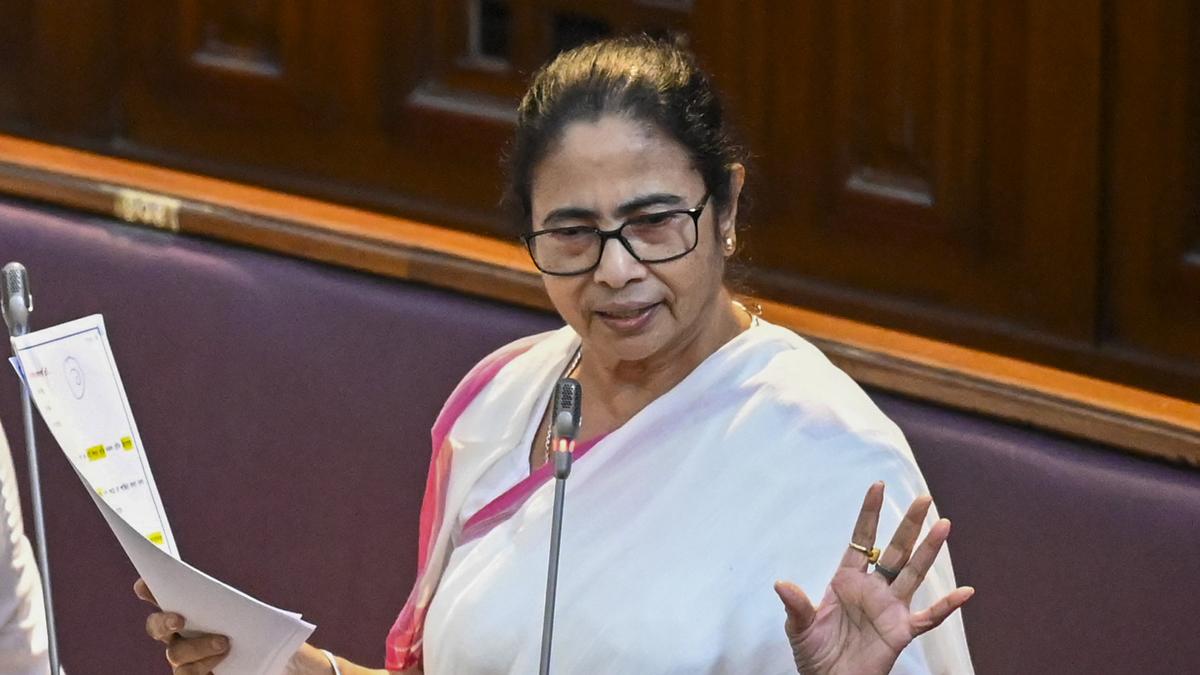Kolkata: In September 2024, the West Bengal Legislative Assembly, under the leadership of Chief Minister Mamata Banerjee, unanimously passed the Aparajita Woman and Child (West Bengal Criminal Laws Amendment) Bill, 2024. This legislation was introduced in the wake of widespread public outrage following the brutal rape and murder of a 31-year-old trainee doctor at R.G. Kar Medical College and Hospital in Kolkata on August 9, 2024. The bill, named “Aparajita” (meaning “unconquered” in Bengali), was touted by Banerjee as a historic and model piece of legislation aimed at addressing sexual violence against women and children through stringent punishments, expedited investigations, and rapid judicial processes. However, despite its stated intent, the Aparajita Bill has faced sharp criticism from legal experts, women’s rights activists, and political opponents, who have labeled it as regressive, unconstitutional, and a politically motivated maneuver to deflect public anger. This article critically examines the bill’s provisions, its context, and the reasons behind the widespread criticism it has attracted, focusing on its legal, social, and political shortcomings.
Background and Context
The Aparajita Bill emerged as a direct response to the public outcry over the R.G. Kar incident, which exposed systemic failures in ensuring women’s safety in West Bengal. The gruesome crime, coupled with allegations of a cover-up involving the state government and hospital authorities, led to protests across Kolkata and beyond. Mamata Banerjee, facing intense scrutiny for her administration’s handling of the case, announced a special session of the West Bengal Assembly to introduce the bill. Passed on September 3, 2024, with support from both the ruling Trinamool Congress (TMC) and the opposition Bharatiya Janata Party (BJP), the bill was framed as a decisive step toward enhancing protections for women and children. It was sent to West Bengal Governor C.V. Ananda Bose and subsequently to President Droupadi Murmu for assent, as it amends provisions of central laws under the Concurrent List of the Indian Constitution.The bill’s provisions include severe penalties, such as life imprisonment without parole or the death penalty for rape convicts if the crime results in the victim’s death or leaves them in a vegetative state. It also mandates a 21-day timeline for rape investigations (down from the previous two-month deadline), establishes an Aparajita Task Force led by women officers for investigations, and sets up special courts for swift trials. Additionally, it enhances penalties for disclosing the identity of sexual violence victims and strengthens provisions under the Protection of Children from Sexual Offences (POCSO) Act. Banerjee described the bill as a “tribute” to the R.G. Kar victim, emphasizing its focus on exemplary punishment, speedy investigations, and rapid justice delivery.
Key Provisions of the Aparajita Bill
The Aparajita Bill amends several sections of the Bharatiya Nyaya Sanhita (BNS), Bharatiya Nagarik Suraksha Sanhita, and POCSO Act to introduce stricter measures. Key provisions include:
Enhanced Punishments: The bill increases the minimum punishment for rape from 10 years (as stipulated in Section 64 of the BNS) to life imprisonment for the remainder of the convict’s natural life or the death penalty, accompanied by a fine to cover victims’ medical expenses and rehabilitation costs. For cases where rape results in the victim’s death or a persistent vegetative state (Section 66 of BNS), the bill mandates the death penalty.
Time-Bound Investigations and Trials: It imposes a 21-day deadline for completing rape investigations, a significant reduction from the earlier two-month period. Special courts are to be established to ensure trials are concluded swiftly.
Aparajita Task Force: A dedicated task force, led by women officers, is proposed to handle investigations into sexual violence cases, aiming to ensure sensitivity and efficiency.
Stricter Penalties for Privacy Violations: The bill increases the punishment for publicizing the identity of sexual violence victims from a maximum of two years (under BNS) to three to five years of imprisonment.
Safety Measures: It includes provisions for installing CCTV cameras and enhancing security for women working night shifts, with the state government sanctioning Rs 120 crore for these initiatives.
While these measures appear robust on paper, the bill’s critics argue that its provisions are poorly conceived, legally flawed, and politically opportunistic, failing to address the root causes of sexual violence.
Criticisms of the Aparajita Bill
The Aparajita Bill has been met with significant opposition from various quarters, including legal experts, women’s rights activists, and political opponents. The criticisms can be broadly categorized into legal, social, and political concerns.
1. Unconstitutionality of Mandatory Death Penalty
One of the most contentious aspects of the bill is its provision for a mandatory death penalty in cases where rape results in the victim’s death or leaves them in a vegetative state. Legal experts, including retired Supreme Court Justice Asok Kumar Ganguly, have pointed out that this provision violates constitutional principles established in the 1983 Mithu vs. State of Punjab case, where the Supreme Court struck down mandatory death penalties as unconstitutional for removing judicial discretion. The Supreme Court has consistently held that mandatory death sentences infringe on the principles of fairness and proportionality, as they prevent judges from considering mitigating circumstances. Critics argue that the bill’s insistence on mandatory capital punishment is regressive, especially at a time when global legal trends are moving toward abolishing the death penalty altogether
The Union government, in its observations conveyed to West Bengal Governor C.V. Ananda Bose, labeled the proposed punishments as “excessively harsh and disproportionate,” raising constitutional concerns about their compatibility with established legal norms. In July 2025, President Droupadi Murmu returned the bill to the state government for reconsideration, citing these objections. The mandatory death penalty clause has been a focal point of criticism, with experts arguing that it undermines due process and risks exacerbating judicial errors in an already strained legal system.
2. Redundancy and Lack of Originality
Women’s rights activists and legal scholars have criticized the bill as a “copy-paste” of earlier legislation, such as Andhra Pradesh’s Disha Bill (2019) and Maharashtra’s Shakti Bill (2020), both of which remain pending presidential assent. Nisha Biswas, a prominent women’s rights activist, noted that the Aparajita Bill lacks originality and fails to address the specific needs of West Bengal’s socio-legal context. Critics argue that instead of introducing a new law, the state government should focus on implementing existing laws effectively, as the Bharatiya Nyaya Sanhita already includes stringent provisions for rape, including the death penalty in cases like the 2012 Nirbhaya case. The bill’s redundancy is seen as an attempt to create a superficial impression of action without addressing systemic issues like underfunded courts or inadequate police training.
3. Undermining Due Process
The bill’s compressed timelines for investigations (21 days) and trials have been flagged as impractical and potentially harmful to due process. Legal experts argue that rushing investigations risks incomplete evidence collection, which could lead to wrongful convictions or acquittals. The emphasis on speed over thoroughness may also overburden an already strained judicial system, particularly in West Bengal, where only six of the 17 sanctioned fast-track special courts (FTSCs) for rape and POCSO cases were operational as of June 2023. Critics point out that the state’s failure to operationalize existing FTSCs undermines its claims of commitment to swift justice, rendering the bill’s provisions more symbolic than substantive.
4. Anti-Feminist and Patronizing Framing
Women’s rights activists have strongly criticized the bill for its language and framing, which groups women and children together, implying that women, like children, are helpless and in need of protection. This protectionist approach is seen as anti-feminist, as it undermines women’s autonomy and agency. Activist Anuradha Sen remarked that the bill’s overnight drafting and lack of consultation with feminist groups or gender audits reflect a patronizing attitude, as if the government is saying, “We have fixed it for you”. The bill’s failure to address structural issues like gender sensitization in law enforcement or societal attitudes toward women further weakens its feminist credentials
5. Political Opportunism
The Aparajita Bill has been widely criticized as a political gimmick to deflect public anger over the R.G. Kar case. Opposition leaders, including BJP’s Suvendu Adhikari and CPI(M)’s Bikash Ranjan Bhattacharya, have called it a “diversionary tactic” to shift focus from the state government’s failure to prevent the crime and allegations of a cover-up involving TMC leaders. Union Minister Kiren Rijiju accused Banerjee of politicizing the trainee doctor’s death, pointing out that the state had previously failed to implement centrally sponsored schemes for fast-track courts under the Criminal Law (Amendment) Act, 2018. The bill’s introduction less than a month after the R.G. Kar incident, without adequate consultation or deliberation, reinforces perceptions of it as a reactive measure to manage public perception rather than a well-thought-out policy.
The bill’s return by President Murmu in July 2025, citing the Centre’s objections, further fueled accusations of political posturing. TMC leaders, including Kunal Ghosh, suggested that the BJP-led central government’s objections to the death penalty revealed a lack of commitment to women’s safety. However, critics argue that Banerjee’s insistence on pushing a constitutionally questionable bill was a calculated move to portray herself as a champion of women’s rights while deflecting blame onto the Centre.
6. Failure to Address Systemic Issues
The bill has been criticized for focusing on punitive measures rather than preventive strategies or systemic reforms. Legal experts and activists argue that harsher punishments alone do not deter sexual violence, as evidenced by the persistence of such crimes despite existing stringent laws. The bill does not address critical issues like inadequate training for police, lack of gender sensitization in the judiciary, or societal attitudes that perpetuate gender-based violence. For instance, West Bengal’s failure to operationalize all sanctioned FTSCs and its backlog of 48,600 rape and POCSO cases highlight systemic inefficiencies that the bill does not resolve. Critics also point to the state’s poor track record in ensuring women’s safety, citing incidents like the 2013 Kamduni rape case, where justice remains pending.
7. Risk of Misuse and Overreach
The bill’s provision to penalize unauthorized reporting of court proceedings in sexual violence cases has raised concerns about press freedom and transparency. Critics argue that this clause could be misused to suppress media coverage and public discourse, shielding the government from accountability. Similarly, the emphasis on mandatory harsh punishments risks disproportionately affecting marginalized groups, as judicial biases often lead to harsher sentences for lower-caste or economically disadvantaged defendants
Political and Social Implications
The Aparajita Bill has deepened political divisions in West Bengal. While the TMC has portrayed it as a bold step toward women’s safety, the BJP and other opposition parties have accused Banerjee of using it to deflect criticism over her administration’s failures. The bill’s return by President Murmu has further escalated tensions, with TMC leaders alleging that the BJP-led Centre is obstructing their efforts to protect women. However, the lack of consultation with stakeholders, including feminist groups and legal experts, has undermined the bill’s credibility and reinforced perceptions of it as a populist measure.
Socially, the bill has failed to address the broader cultural and systemic factors that perpetuate sexual violence. Activists argue that true reform requires investment in education, gender sensitization, and institutional accountability rather than symbolic legislation. The bill’s focus on punishment over prevention has been criticized as a missed opportunity to tackle the root causes of gender-based violence, such as patriarchal norms and inadequate support for survivors.
The Aparajita Woman and Child (West Bengal Criminal Laws Amendment) Bill, 2024, introduced by Mamata Banerjee’s government, was presented as a landmark effort to combat sexual violence in West Bengal. However, its provisions have been widely criticized as unconstitutional, redundant, and politically motivated. The mandatory death penalty violates Supreme Court precedents, while the bill’s rushed drafting and lack of originality fail to address systemic issues in the justice system. Its patronizing framing undermines women’s autonomy, and its punitive focus neglects preventive measures. Politically, the bill appears to be a reactive attempt to quell public anger over the R.G. Kar case rather than a genuine effort to reform the system.
The return of the bill by President Murmu in July 2025 underscores its legal flaws and highlights the need for a more thoughtful approach to addressing sexual violence. Rather than relying on emotionally charged but superficial solutions, West Bengal’s government must prioritize implementing existing laws, strengthening judicial infrastructure, and fostering societal change to ensure meaningful progress in women’s safety. The Aparajita Bill, in its current form, represents a missed opportunity to address these deeper issues, serving instead as a case study in the limitations of populist legislation
Reference :
Aparajita Bill: A knee-jerk reaction
https://frontline.thehindu.com/social-issues/gender/west-bengal-aparajita-bill-mamata-banerjee-trinamool-government-r-g-kar-hospital-rape-murder-abhaya-case/article68638222.ece
Women activists, lawyers flay Mamata Banerjee’s Aparajita Bill
https://www.telegraphindia.com/west-bengal/women-activists-lawyers-flay-mamata-banerjees-aparajita-bill/cid/2046539
Why opinion is sharply divided on Mamata govt’s Aparajita Bill
https://www.indiatoday.in/india-today-insight/story/why-opinion-is-sharply-divided-on-mamata-govts-aparajita-bill-2594865-2024-09-07
Bill a bid to deflect attention, says BJP after supporting it
https://timesofindia.indiatimes.com/city/kolkata/bjp-accuses-aparajita-bill-of-being-a-diversionary-tactic/articleshow/113044480.cms
*President returns West Bengal’s Aparajita Bill, flags harsh rape penalties*
https://www.newindianexpress.com/nation/2025/Jul/25/president-returns-west-bengals-aparajita-bill-flags-harsh-rape-penalties
Governor Returns Aparajita Bill To Bengal Government, Trinamool May Protest
https://www.ndtv.com/india-news/governor-returns-aparajita-bill-to-bengal-government-trinamool-may-protest-8951059





